Archive for October, 2022
Toledo- an old city with a lot of Spanish flair
- Biology M.Sc.
- Spain, Toledo
- Hospital Nacional de Paraplejicos
- 04.05.2022-30.09.2022
My name is Anna, and I have been studying at the “Hospital Nacional de Paraplejicos” in Toledo from May to October 2022. I study Biology in my Masters. In the following, I will try to share knowledge with you that will help you to make the best out of your stay.
The preparation for my internship focused on transport, insurance, and housing. For my research internship abroad, I travelled to Toledo by plane. I arrived at the airport in Madrid and travelled from there to Toledo by train. If you do not want to go by plane, you can also go by railway. This takes a little bit longer, but you can combine your travel with some stopovers in other beautiful cities. Further you save some CO2 and secure the additional Erasmus funding for a green travel back home.
The health insurance is very simple. If you didn’t already have one included, you can ask your insurance to provide you with a European health insurance card. Keep in mind that most insurances do not cover rescue or repatriation in case something goes wrong on a hiking trip for example. You should ask your insurance about that.
I started to look for a flat or a room in Toledo approx. one month in advance. I made some visiting appointments for the first few days. During this time, I was living in a guest room in the professor’s house. The apartment search turned out to be very difficult. I tried to find a flat with the website “Idealista”. Many accounts didn’t even answer or other flats where small or dubious. Also, the language barrier was a big problem, due to the reason that the most landlords did not speak English. I would recommend all students doing an internship in Spain, to practice some Spanish before your internship abroad. Without the help of my work mates most of the viewing appointments were not able. Further I would recommend structuring your profile on those websites so personal as possible. If you apply for an apartment, you should always bring some personal stuff inside the texts and maybe take up some points of their advertisement.
After visiting some flats without any success, one of my workmates had the idea to look for a room in a student’s residence. I found a place in the “Residence María Immaculada Toledo”. Here I lived in a single room in the casco of Toledo. The rent for one month was 520 euros including breakfast, lunch, and dinner. This room was only available for 1 month, so I had to look for another flat in the meantime. Happily, I found my perfect flat quickly. It was a shared flat with three other Spanish girls in the age between 25-30. All three of them were as well working in the hospital. The flat was just perfect, with a large living room, a large kitchen, and a swimming pool. It was also near to the hospital, so I could walk every day by foot to the work. The rent here was 250 euros excluding extra costs like water and light.
My first impression of Toledo was impressive. It is an old city with a lot of Spanish flair. Exactly what I had expected from Spain. I applied for a position in the “Hospital nacional de paraplejicos”, to do my practical course of my master thesis there. The hospital and the investigation have their focus on spinal cord injuries. The hospital is very new and modern, and my work collogues were helpful and nice from the first moment on. I really enjoyed the work in the hospital. The willing to help was so large from all my work mates, and they integrated me into their team very quickly. I learned a lot of new techniques important for my further working live. I was working on my own project. Although the working language in the laboratory was English, it turned out to be a little bit tricky to communicate. The English knowledge of most of my collogues was rather bad. On the other hand, my Spanish knowledge was not the best. So I decided to learn a lot of Spanish int the next few weeks. The understanding was getting better from day to day. As well in English, but also in Spanish. Quickly I was able to follow conversations in Spanish and to talk some basic sentences.
With the girls of my flat I made friends quickly. They took me on hiking tours, we all signed in for the gym and they told me how to play padel tennis, a very popular sport in Spain. On the weekends we normally went out together and they introduced me to their friends. They took me to cultural events in Toledo and told me which places are worth to visit. Another positive point is the close distance to Madrid. It is only 30 minutes by train, so you can also explore the capital of Spain on the weekends.
Going to Toledo was one of the best decisions of my life. The “Hospital nacional de paraplejicos” is a great hospital with nice work mates and a great investigation department. On top, Toledo is a nice, typical Spanish city with endless opportunities and a close distance to Madrid. I hope that my short report gave you some insights into these opportunities.
My practical year in France
- Staatsexamen, Medizin
- Rouen, France
- Hôpital Charles-Nicolle de Rouen
- May 2022 – September 2022
Preparation
The preparation began about a year before I started my Practical year (Praktisches Jahr- PJ). For the registration and application, I contacted Ms. Watteel directly, who is responsible for Erasmus stays at Université de Rouen Normandie. She was my contact person during the entire Erasmus stay and took care of all formal requirements and certificates in a timely manner.
Housing
Accommodation can be found at leboncoin.fr (something like Ebay in Germany) or Facebook. There is also the possibility to apply for student residences, but I did not do this. Furthermore, there are many real estate companies in Rouen that rent both furnished and unfurnished apartments. It should be noted that if the apartment is rented through a company, a fee of approximately one month’s rent must be paid. For students, the right side of the city is warmly recommended, because most of the activities and parties are on this side of the city. There are good bus connections to other parts of the city, but they are very limited at night. The university hospital is located almost in the city center and is easily accessible by public transportation.
Job and everyday life
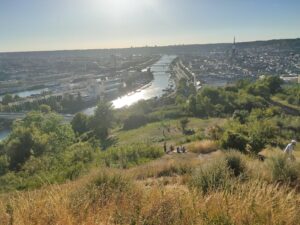
© Lara Gubeljak
I completed a PJ tertial in the clinic for general surgery (chirurgie digestive). There I was in the OR every day and was allowed to assist most of the time, be it directly on the patient or administering the instruments. There were many opportunities for me to actively participate. I found it very good that I was allowed to sew up, that I could participate in organ donations, and that I was also able to perform some tasks beyond the student tasks. A normal day started at 7:30 a.m. and ended between 4:00 p.m. and 6:30 p.m. The visceral surgery team was very nice and had a lot of patience, especially when I occasionally didn’t understand things because of the language barrier. There were some doctors who also explained things in English, although this is not the rule in France.
For the internship, you get a reimbursement of about 250€ per month, but you must check with the HR department often and have a French bank account. All students who are currently doing their internship in a surgical department share the 24 hour duties among themselves. These services are additionally paid but are not obligatory for exchange students. During the night duty you have to do instrumentation and assist in the OR. You get your own room with your own DECT phone. If you are lucky and there are no emergencies, you may (and should!) sleep.
Leisure
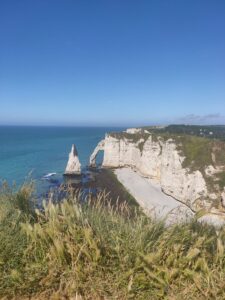
© Lara Gubeljak
I was very fortunate to have a large circle of friends in Rouen, which made the stay overall very social and gave a different perspective to the busy PJ. It is very common to end the evening in a bar or café, although it must be said that due to the early working hours this was often not possible. Rouen is a student city and there is always something going on. In summer there are concerts every Thursday, there is the daily Cathederal de Lumiere, which was exciting every time again. It is a beautiful city from the Middle Ages, so there is a lot of history to see. The numerous museums are free until the age of 26. The surrounding cities like Paris, Le Havre, Étretat or Vernon are very worth seeing and easy to reach by train.
Conclusion
Rouen should and can definitely be recommended for tourism as well as for the PJ. I learned a lot there, was able to do a lot of practical work and strengthened many social skills in the professional setting. The beginning of the PJ was very exhausting, because a lot of things happened very quickly in the hospital and the medical terminology is clearly different, plus it contains many abbreviations. It was a great opportunity to deepen my French and to get an insight into general surgery. Four months were enough to settle in well and to get a little insight into the rest of Normandy.
Writing my master’s thesis in Almería, Spain
- Energy Engineering M.Sc.
- Spain, Almería
- German Aerospace Center (DLR)
- March 2022 – August 2022
The Institute for Solar Research, which is part of the German Aerospace Center (DLR), maintains a research site in Almería in the south of Spain. I spent six months at this location to write my master’s thesis.
Preparation and general tips:
I applied for the master’s thesis in November 2021 and received an invitation to an online meeting with my supervisor quite quickly. After I had the acceptance and we agreed on a topic, I applied for the Erasmus scholarship in January 2022. In February 2022, I booked my flight and started looking for an apartment. The apartments and shared rooms in Almería are cheaper compared to Germany. I found my apartment through “idealista” and had support from people who also worked at DLR and already lived in Almería. Since you can find an apartment quickly, you can also move into a hostel for the first few days and start looking locally.
I recommend looking for an accommodation in the Centro (near the bars and restaurants) or in Zapillo (near the beach), because you can get everywhere quite quickly from there. Most of the landlords do not speak English, so you should write your requests on “idealista” in Spanish. From a language course, I already knew some basics in Spanish, but I mostly got by with an online translator. Also, if you start at DLR, make sure you get a rental contract, as you will need it for later registration with the authorities.
Job and everyday life:
Some students had to take the bus to the Plataforma Solar de Almería (PSA) in Tabernas (about 45 minutes). I worked in the office in the center of Almería. It is surrounded by many different tapas bars and restaurants. We made use of this with the colleagues and usually went out during our lunch break. Eating tapas in Almería is comparatively inexpensive.
In the office we communicated in German or in English. In everyday life, however, you need Spanish, because most of the local people do not speak English. Thus, one learns the most important basics quite quickly. If that’s not enough, you can take a language course (there are several language schools in Almería) or participate in the events of the Erasmus Office to find a language buddy.
Almería is a small town but has everything to offer what you need. Plenty of supermarkets, a nightlife and larger shopping centers a little outside. The university is also located a bit outside but is easily accessible by bus. Almería has an airport, but unfortunately there are no direct flights from Germany.
Leisure:
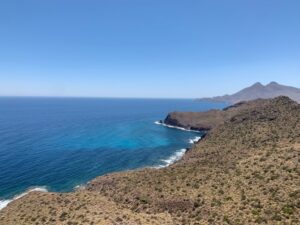
© Rafal Broda
The weather in Almería is great. After work, I often met up with my colleagues from DLR, my roommates or other Erasmus students. We usually met on the beach to play beach volleyball. In the evenings, you can go out for tapas in Almería or go dancing in one of the music bars. I have found that it is quite difficult to socialize with local people, mainly because of the language barrier, but since there are a lot of international students coming to the university, it is overall quite easy to make new contacts. On some weekends we made trips to the nearby nature park Cabo de Gata. There you can hike, snorkel or just relax on one of the many beautiful beaches. I can highly recommend a visit there. On long weekends, you can also take a trip of several days to Granada or Seville to explore Andalusia a bit. From Almería, you can also take a ferry to Morocco. If you are interested, remember to bring your passport.
Conclusion:
Overall, I had a very nice time in Almería. I can definitely recommend doing an internship or thesis at the Institute of Solar Research in Almería. I experienced a lot during this time, met many nice people and improved my Spanish.
Working in one of the most beautiful cities in Europe – Amsterdam
- Environmental Engineering M.Sc.
- Netherlands, Amsterdam
- Metabolic Amsterdam
- 28.02.2022 – 26.08.2022
Preparation
Already four months before the planned start of the internship, I start looking for a suitable position. At this point, it is clear to me that I want to gain several months of professional experience in the field of sustainability strategies for public or private institutions. Since my studies are rather technical, a direct connection between the academic content and a practical job seems rather unlikely. Another challenge is that my idea covers a very broad area and often refers to advertised positions with very different descriptions. This makes the search even more difficult.
In my case, the path to a successful application therefore requires ambition and stamina, as I have to work my way through the long list of results after searching for “Sustainability Intern” several
times. A position at a sustainability consulting company that is looking for interns in the area of circular economy with a background in recycling technologies turns out to be promising.
As a platform to search for advertised jobs, I mainly use LinkedIn or Glassdoor. Furthermore, I would recommend going to the website of companiesthat appeal to you, as many do not upload their open positions on all job platforms. Alternatively, a speculative application is also possible at any time, as especially with practices companies are often interested.
Formalities
The experience of doing an internship in another EU member country shows me once again the many advantages of the European Union. Of course, as an EU citizen, no separate visa is required for employment in Amsterdam. The employer, who is used to receiving applications from abroad, has the necessary experience here and checks this out directly during the application process. A big challenge, especially in the Dutch capital, is finding a suitable and, above all, affordable apartment. I am lucky enough to be able to go on a flat-share search together with a contact person who already works in Amsterdam, which makes this process much easier. As a recommendation, I can give at this point various online portals, which, however, must be updated several times a day in the period before the planned move to have any chance of finding accommodation. Students who decide to work in the Netherlands are required to register for a so-called citizen service
number BSN. This can be done at the local administration and is necessary for tax reasons. Furthermore, one is obliged to take out a Dutch health insurance. However, this only applies if the remuneration of the job is above the legal minimum wage. Since it is possible for students to have a lower salary, it is possible that such insurance is not necessary.
Working Environment
At this point, it should first be mentioned that my experience is not meant to be representative of a typical working environment in Amsterdam. Nevertheless, I have the impression that openness,
calmness, flexibility and flat hierarchies are standard rather than the exception. As an intern at my employer, you are usually assigned to a specific supervisor in a specific team. Since
the areas of responsibility of the individual teams differ significantly in terms of both content and working methods, the activities of the interns also vary accordingly. In general, it can be said that in most cases interns are seen as an addition to the core team and are integrated as such. At the beginning of the internship phase, a plan is drawn up together with the supervisor and with the help of the HR department, with which expectations both sides go into this temporary employment relationship. Particular attention is paid to which goals are pursued and which means are necessary to achieve them. The main aim is to address the individual strengths of the people concerned and to promote them, or to identify weaknesses and counteract them. The work of the team to which I have been assigned specializes in the direct or indirect support of private clients from industry. A large part of the work consists of analyzing products and production processes. The goal is to find leverage points by looking at the entire system in order to make it more sustainable. In most cases, this means using resources more responsibly. For example, it may involve minimizing waste streams, restructuring processes to reduce energy requirements, or revising product design to think about both materials and the product itself in cycles. During the support phase or the cooperation with the customer, it is always of great importance to let all stakeholders participate in the status of the work and relevant decisions. This is referred to as stakeholder engagement. The idea is that through analysis and suggestions from external partners, a certain resistance to this intervention can develop. However, one make the experience that a view from the outside can be quite helpful to rethink products and processes to get closer to the set goal. In order to reconcile these two sides and thus achieve the best possible and sustainable result of the
collaboration, it is very important to involve all areas of work and hierarchical levels.
Living in Amsterdam
The capital of the Netherlands, located on the Ij, is in my opinion one of the most beautiful cities in Europe. Especially the famous city center with its many canals, the so-called Grachten, is stunningly beautiful. As a first recommendation from my side are therefore not any museums or special buildings, but simply a long walk in the canal belt of the city. Within this beautiful area, you should rather avoid the middle between the Central Station and Dam Square, because most tourists are here. Culturally, the city has an incredible amount to offer. It has the highest museum density in the world and contains, among other things, in the famous Rijksmuseum also many international works of geniuses such as Rembrandt or van Gogh. As another classic, the Anne Frank House is definitely recommended. The minimalist exhibition of the rooms where the family hid from the Nazis is oppressive and yet incredibly fascinating. However, early booking is necessary. If you want to spend a little more time in nature, you can explore the huge city park Amsterdamse Bos.
Summary
The bottom line is that my personal field of activity during the internship deviates only slightly from the field of activity of a junior consultant. The reason for this is that I and other interns are generally very well integrated into the work of the core team, with consideration being given to the strengths, skills and preferences of the individuals. Overall, it can be said that the daily work routine is very diverse. On the one hand, this is due to the fact that the work on four different projects in conjunction with the cross-project work covers several sectors of the industrial economy as well as sociopolitical aspects. On the other hand, the work within a project consists of many facets. This includes research of relevant data as well as their processing and integration into models. This data analysis often includes the recognition of patterns and the translation into information that can be presented to the client. Furthermore, the evaluation of interventions to address different points of sustainable performance of private and public organizations plays an important role. On the one hand, this requires a clear understanding of the problem to be solved, for which a thorough understanding of the data provided is necessary. Additionally, a basic knowledge of industrial processes with the corresponding physics or chemistry behind them is necessary. Another important component of the work, also for me as an intern, is a well thought-out and transparent communication with customers and partners.
My experience in Rotterdam, Netherlands
- Architecture M.Sc.
- Rotterdam, Netherlands
- Barcode Architects
- March 2022 -August 2022
From March to August 2022, I was doing a six-month Internship at Barcode Architects, an international architecture office in Rotterdam (Netherlands). It has been an amazing experience, where I was able to work with many interesting and talented people from all over the world on a variety of different projects. I recommend doing an internship at this office and in general in Rotterdam. Rotterdam is a great city especially for architecture students (but of course also for everybody else) because it is an “architecture city”. What I mean by that is that you can find there various buildings, architecture related events and international offices. It is a young, dynamic city that offers different activities and events every week for everyone who is interested.
Preparation / Apartment search / General tips:
After I got the confirmation of my internship position, I started looking for an accommodation. In the Netherlands, most people I know found their accommodation through Facebook or the housing website Kamernet. It wasn’t easy to find a room, but finally I was lucky to find a nice one in a shared apartment before my arrival. I recommend you to start as early as possible to search for an accommodation and respond quickly to possible advertisements because the housing market in the Netherlands in general and in larger cities in particular is tight. I was living in beautiful Rotterdam North, which is a family-friendly district with lots of old Dutch houses and a calm atmosphere. It’s right above the central station, so very centrally located. I just needed approximately 10 to 13 min. by bike to get to the office. Everything you need in Rotterdam (and the Netherlands in general) to get around, is a bike because there are separate bike lanes next to the streets, almost everywhere in the city. And although Rotterdam is large, you get everywhere fast by bike and if you want to go further, it has a well-developed public transport system.
Leisure / Going out:
You will always find something to do in your spare time in Rotterdam, whether you want to dance on a festival, get some drinks at a bar, visit another city nearby as Delft or The Hague, do some sports or visit an art exhibition or event. Every week something else is happening in Rotterdam. One of these exciting events were the Rotterdam Architecture month. The whole of June was dedicated to architecture and you could visit lectures and rooftops in Rotterdam. There were also special rooftop installations designed by the architecture office MVRDV, to show how we could use existing rooftops to create more sustainable cities. There also some beaches nearby Rotterdam as for example Hoek van Holland or Scheveningen which you can easily reach by public transport to go swimming, sunbathe or rent a surfboard. Overall, it was a great time, during which I was able to learn a lot and broaden my horizons. I’m grateful for this experience and also for the support of the Erasmus Internship organization.
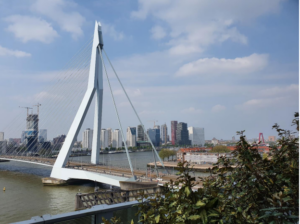
© Laetitia Augustyniak
Many activities in Vienna
- Architecture M.A
- Vienna, Austria
- Alles Wird Gut Architektur
- 01.03.2022-01.09.2022
Since an excursion to Vienna in my third semester, I had already made the decision to complete my mandatory internship not in Germany, but in Vienna. At that time, I was already very impressed by the city and, since I could imagine moving to Vienna at some point in the future, I wanted to get a taste of everyday life and work in Vienna during my internship.
Looking for an apartment in Vienna is not very easy, especially at the beginning of the semester, because a lot of people are looking for an apartment at once. As in Germany, you look for shared flats mainly via WG-gesucht, otherwise there are also many ads on “Willhaben”. However, Vienna has the great advantage that the rents are comparatively cheap, unlike most large German cities. The best and most popular are the neighborhoods around the Ring and Gürtel. I was very lucky in my search for an apartment and found a nice shared flat in the Seventh, probably the hippest neighborhood in Vienna. In general, I would always recommend moving into a shared apartment for a stay abroad, as it is much easier to make friends in the new city.
I completed my internship in a fairly large architecture firm, which also has a large number of interns. We were a total of 10 interns, who all started at the same time as me in March. Since, except for two, all of them were not from Vienna and were also new to the city, we were all able to explore the city and life in Vienna together, which I am very grateful about. Over the course of the internship, a great friendship has developed here that goes far beyond the work and the internship. We often had a beer together after work on the Donau Canal, went swimming together in the Donau on the weekend, or went hiking in the vineyards. I got used to the daily routine in the office very quickly, and over time certain routines became established. For example, we went out to eat together every day as a group of interns in the office canteen, then played a round of foosball or table tennis in the canteen, and then went for a little digestive walk, wich route varied less and less towards the end of the internship. In addition to the activities with the other interns, there were also numerous small events and evenings within our office, where you also got to know the rest of the office better. So in the end, saying goodbye was harder than expected.
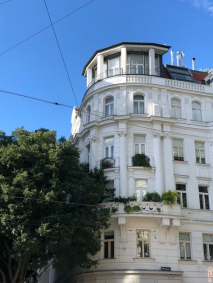
© Katharina Klöters
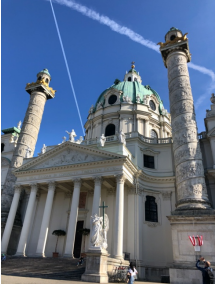
© Katharina Klöters
Vienna is a city that has a lot to offer – it is not for nothing that it is the most livable city in the world. The city center is adorned with one magnificent building after another and the streets of the surrounding neighborhoods are lined with beautifully decorated old buildings. In general, I noticed that the city is very clean and also does a lot for the preservation of the buildings. In addition, drinking fountains are available throughout the city; especially in the summer when sightseeing with people who are visiting, this is a blessing. The Danube Canal runs through the city, fortunately for me, right in front of my office. This is where people meet, especially in the early evening, and enjoy the beautiful evening atmosphere and residual warmth of the stones on the waterfront while having a drink. Half an hour away from the city center you are at the actual Donau and the Donauinsel. Here you can go swimming, especially in the hot summer months, and sunbathe in the greenery or on the jetties on the Old Donau. Thereby one has a beautiful view, with a mixture of nature, vineyards and urban city silhouette. Those who prefer to spend their weekends actively will not miss out in Vienna either. In addition to the numerous sporting opportunities at the Prater and the Donau, you can also simply go hiking in the vineyards or ride up the serpentine road on a bike. In the vineyards there are Heurige on every corner, where you can enjoy a great view over the vineyards and Vienna and taste the local wines and delicious food. On a classic wine walk in Vienna, you go from Heurigen to Heurigen, enjoying the sun and drinking wine or spritz. Culturally, of course, the city also has a lot to offer. In the Museumsquartier, for example, one museum follows the next, but I can also highly recommend a visit to one of the theaters and the opera. There are often student offers here as well. The nightlife in Vienna also leaves nothing to be desired. So there are, especially in the Seventh and Second District, many cool bars and generally clubs for all kinds of music. I especially liked that there were also dance bars on the Donau, where you could party and dance after swimming with a view of the water.
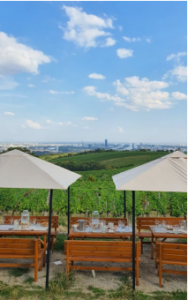
© Katharina Klöters
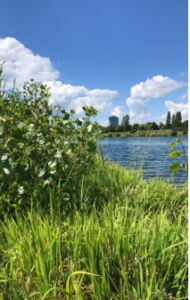
© Katharina Klöters
During my stay in Vienna, I explored not only Vienna, but also the surrounding area. In addition to trips to other parts of Austria, such as Lake Neusiedl or Graz, Vienna’s location makes it ideal to travel to other countries. For example, I took a bike tour to Bratislava and a weekend trip to Budapest. There were many more trips planned, but in the end I decided to spend more time in Vienna, because the time there goes by much faster than one would like and I wanted to enjoy it, especially with the people there. The people in Vienna are, as in probably every capital city, very diverse. Nevertheless, I had at least the feeling that Vienna is overall a fancier and not quite as open city as I had imagined. Depending on the district, one often finds rather unfriendly, often well-heeled Viennese. However, if you have found your circle of friends and your favorite places, you can work around that well. All in all, I found my stay in Vienna very successful and can only recommend it. Vienna is a beautiful city that has something to offer for everyone. I will especially miss the Donau and the view of the vineyards. But also the daily walks during lunch break, where you always discovered new corners and houses of Vienna.

